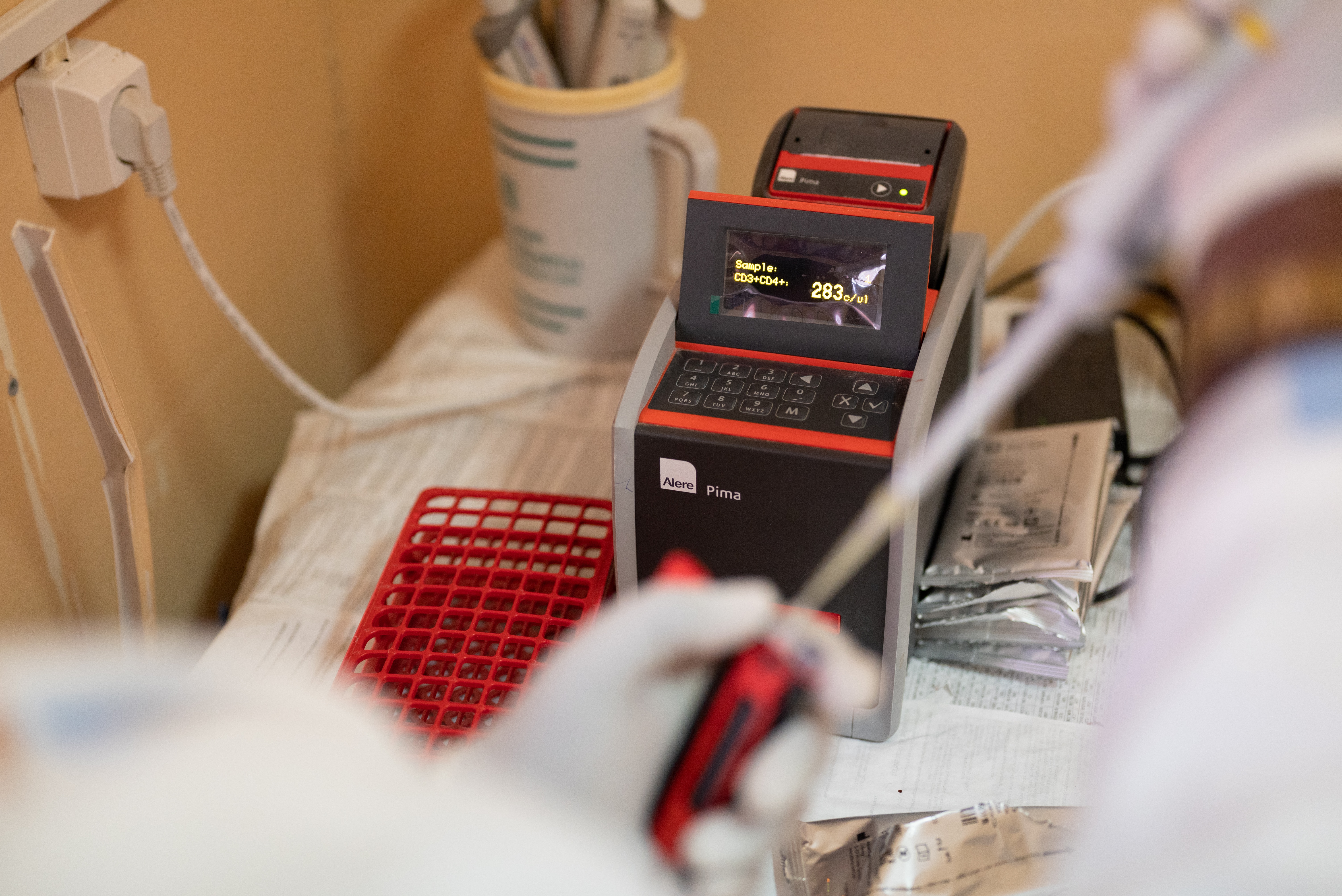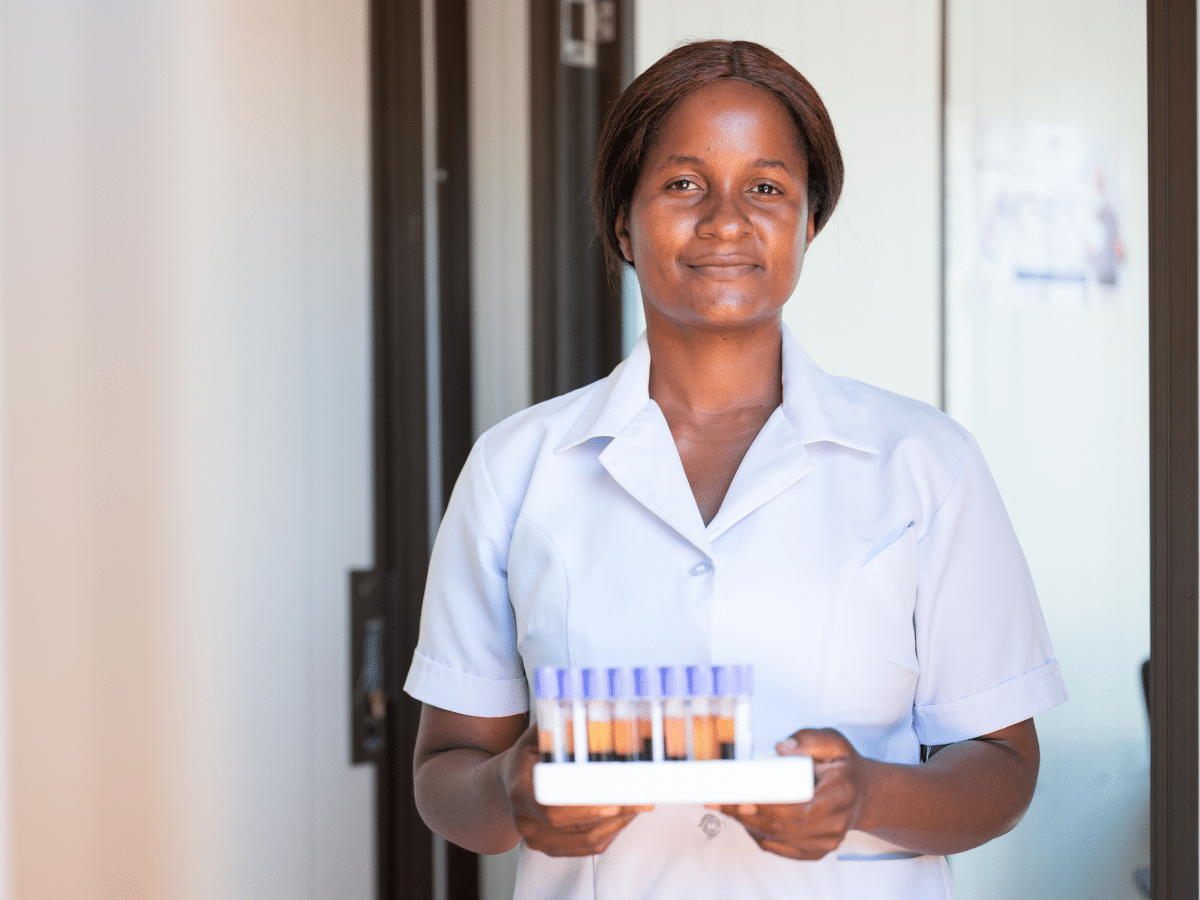In Western Province, Zambia, numerous challenges at health facilities – such as limited technical capacity among health workers, weak commodity security, and lack of equipment – contributed to poor management of Advanced HIV Disease (AHD). Opportunistic infections, including cryptococcal meningitis and tuberculosis (TB), were causing premature deaths among people living with HIV.
With support from the U.S. President’s Emergency Plan for AIDS Relief (PEPFAR) through the U.S. Centers for Disease Control and Prevention (CDC), ICAP in Zambia targeted 42 high-volume health facilities in Western Province to close gaps related to AHD management, achieving nearly doubled AHD screening in just four months.
People living with AHD – the most severe stage of HIV infection, at which point the body’s immune system struggles to fight opportunistic infection – are at high risk of death even after initiating antiretroviral treatment (ART). The most common causes of severe illness and death in AHD patients are TB, severe bacterial infections, and cryptococcal meningitis. AHD occurs more frequently in individuals newly diagnosed with HIV and individuals who have interrupted treatment.
Despite increased HIV treatment coverage in Zambia, challenges in addressing AHD at the health facility level remain due to limited access to and training on existing or new tools for preventing AHD-related deaths.
In October 2023, ICAP in Zambia began implementing training, mentorship, and virtual learning sessions among health staff at 42 health facilities in Western Province, sharing knowledge on clinical management, monitoring and evaluation, pharmacy and laboratory, and quality improvement for AHD. ICAP introduced CD4 point-of-care testing and CD4 on-demand testing – a test that assesses the health of the immune system and is the gold standard for diagnosing AHD – to ensure immediate identification of AHD cases.
In addition, ICAP introduced novel registers and other data collection tools developed in collaboration with an AHD and non-communicable disease (NCD) stakeholder group to improve documentation for AHD and NCD service delivery. Supply chain management support provided by ICAP enabled TB and cryptococcal infection screening using Lateral Flow Urine Lipoarabinomannan Assay (LF-LAM), a point-of-care test used to diagnose TB, and cryptococcal antigen testing, a test used to diagnose cryptococcal meningitis. Quality improvement interventions, such as reorganization of client flow, appointment of AHD champions at health facilities, reinforcement of interdepartmental meetings, and strengthening of test sample-delivery courier systems, were implemented at health facility levels.

The World Health Organization defines AHD for adults, adolescents, and children five years and older as having a CD4 count of less than 200 cells per cubic millimeter.
By March 2024, ICAP had trained nearly 500 health staff, including nurses, clinical officers, lab staff, monitoring and evaluation staff, community-based volunteers, counsellors, doctors, and AHD champions, on AHD management.
“The program has really helped,” said a health staff member who received AHD management training. “As a facility, we are able to conduct CD4 testing, screen for cryptococcal infection and meningitis using cryptococcal antigens, and conduct urine screening for TB in real time before the patient goes back home. As clinical staff, it gives us an opportunity to manage the patient appropriately.”
MM, a recipient of care in Western Province living with AHD, was on the other side of that improved care. She said that when she first began to feel ill and extreme pain in her knee, she visited numerous traditional healers. Unfortunately, her condition only worsened.
“My mother opted to take me to the health facility,” MM said, referring to one of the 42 health facilities ICAP supports with AHD management mentorship. “I was tested for HIV and I was told I was positive. I also tested positive for TB…I must say, since I started the medication, I am feeling much better. All the pain in my body is gone and I am now able to walk even though the knee is not completely healed.”
“I appreciate so much the work the health workers are putting in to ensuring patients get the help they need,” remarked MM’s mother. “I would have lost my daughter.”
Following ICAP’s support, AHD screening using CD4 testing increased from 45 percent in November 2023 to 88 percent in March 2024. During this time, 334 recipients of care with AHD were identified. While only 24 health facilities were previously conducting routine CD4 testing, all 42 health facilities now use CD4 testing to identify and manage AHD cases.
In addition, case identification for cryptococcal meningitis increased from zero to seven, and for TB case identification, from two to 77, between November 2023 and March 2024. All recipients of care diagnosed with cryptococcal meningitis and 98 percent of recipients of care diagnosed with TB initiated treatment. In the coming months, ICAP aims to replicate the AHD training interventions to low- and medium-volume facilities in Western Province and to all health facilities in North-Western province as well.
“As Zambia’s HIV program strives for greater sustainability, addressing AHD is crucial,” said Tafadzwa Dzinamarira, MSc, MPH, PhD, country director of ICAP in Zambia. “Early identification and treatment of AHD cases not only saves lives but also reduces the burden on the health care system. ICAP’s AHD management interventions are paving the way for a more efficient and effective HIV response.”
Photos by Artur Francisco for ICAP
About ICAP
A major global health organization that has been improving public health in countries around the world for two decades, ICAP works to transform the health of populations through innovation, science, and global collaboration. Based at Columbia Mailman School of Public Health, ICAP has projects in more than 40 countries, working side-by-side with ministries of health and local governmental, non-governmental, academic, and community partners to confront some of the world’s greatest health challenges. Through evidence-informed programs, meaningful research, tailored technical assistance, effective training and education programs, and rigorous surveillance to measure and evaluate the impact of public health interventions, ICAP aims to realize a global vision of healthy people, empowered communities, and thriving societies. Online at icap.columbia.edu








